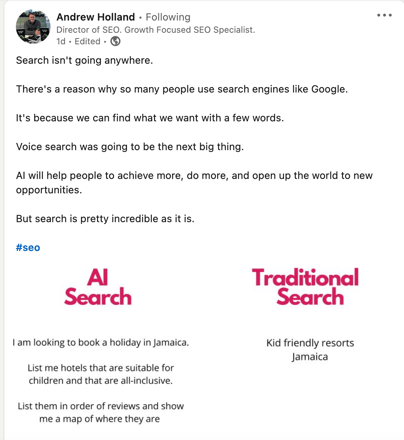-
 Written by Sean Dougherty
Written by Sean DoughertySenior Brand Creative at Funnel, Sean has more than 15 years of experience working in branding and advertising (both agency and client side). He's also a professional voice actor.
Since ChatGPT was launched in late-November 2022, interest in AI-related tools has exploded — especially among marketers.
The opportunities for marketing teams are immense and will result in significant industry changes, some of which have already occurred. For example, in recent years, marketers have needed to adjust to significant changes in tracking data to ensure greater privacy measures. AI chatbots could be another curve ball for those heavily invested in search advertising.
Spending on search advertising in the United States increased by nearly 8% in 2022, reaching $84.4 billion. Search remains the most invested-in digital ad format in the nation, representing a 40% market share. However, as chatbots advance, they could disrupt this changing landscape.
How will AI chatbots and large language models shake things up for search advertising, and how can you pivot? This guide dives deeper into the future of this relationship and explores how you can better prepare.

How traditional search engines work
Google Search processes more than 8.5 billion searches daily, showcasing the importance of search engines in everyday life.
Traditional search results are created and adjusted based on the following:
- Crawling: This involves discovering new and updated content to store and organize.
- Indexing: Once web crawlers find content, such as images or web pages, they can index the relevant links to later match relevant queries. Yet it is important to note that only part of all content is indexed.
- Searching: Search queries are typed in by the search engine's users.
- Ranking: Based on the query, the location of the searcher, their device, and many other factors, the search engine shows organic results, ranked from most useful to less useful. For some queries, ads are also shown in the SERP (Search Engine Results Page).
Search engine optimization (SEO) is the art and science of getting higher organic search results. Search engine advertising (SEA) creates and runs ads in search engines like Google or Bing.
When you develop a competitive search advertising strategy, you can effectively attract organic and paid traffic, boosting conversions, including leads, sales, and revenue.
Related: SEO performance dashboard - templates and tips
How ChatGPT, Bing, and Bard are going to change SEO and paid search
The concept of "chatbots" began in the earliest days of the internet, and while voice assistants like Siri have been around for years, the AI chatbots of 2023 are in another league. These chatbots, such as ChatGPT, are changing how companies approach all aspects of their businesses, including their marketing strategies.
For example, text generation is catching the attention of millions worldwide. ChatGPT alone attracted 100+ million users in just a couple of months, setting a record for the fastest-growing consumer application in history.
AI content marketing is gaining industry-wide attention, but what about search advertising?
How will generative AI search impact your website visibility, traffic, and revenue?
There is no denying the advantages of modern large language models (LLMs) and AI bots. These software programs are highly efficient at accessing information online. However, they could pose a risk to the traditional online advertising industry, which relies on search advertising and clicks to drive revenue.
For example, tools like Microsoft Bing Chat and Google Bard can easily access real-time data without the user needing to open a new tab or leave the chat interface. Meaning the user will get answers from sites without having to visit them. If traffic isn't pushed back to these sites, those who don't adapt could see significant drops in revenue.
So, the widespread implementation of AI-powered search engines could cause users to bypass the ads on search result pages and websites entirely, changing how people consume content online. While most reputable sites will likely live on, it's easy to see how this could become a slippery slope.
These considerations are crucial in 2023 and beyond, as you'll need to invest in the right AI-powered tools to adapt effectively. If you don't, your competitors will, which could expose you to greater ongoing financial risks.
While this is still a gray area, you need to consider the possibility of challenging your existing business model. It's best to be prepared — understanding the potential impact of AI chatbots will help ensure related revenue isn't lost.
How to prepare for the AI-powered search engine
AI-powered search engines are here to stay, so you'll need to stay ahead of the game.
How do you do that? Become educated about the future of advertising as it relates to AI chatbots, following the latest trends and news. Based on how technology is evolving in this space, AI-powered search engines could change websites sooner than anticipated. There are some clear signs already, like Microsoft's recent announcement about "reinventing search with a new AI-powered Bing and Edge."
This new Bing experience is eye-opening, as it unifies the user experience — browsing, searching, and chatting are offered in one complete package. The concern is how this will affect the traditional search process and website traffic. If fewer people go to traditional search engines for the answers they seek, that could lead to less traffic and decreased revenue — not to mention the ethical dilemmas surrounding privacy, transparency, and bias.
However, generative AI's impact on search advertising is still early days. It's too soon to know how AI search will alter websites, but that doesn't mean you can't plan. For example, prepare for changes that will impact your business the most. Clicks from informational queries could start to drop off. In comparison, commercial queries will likely see a combination of chat and classic search.
The goal is to remain relevant in a potentially AI-driven search engine world, leveraging the advantages of AI for marketing creatives. What would that look like, and how would your company need to adjust concerning your search advertising and overall marketing strategy?
Strategies to help you adapt
Understanding how AI chatbots could revolutionize the search landscape helps you plan for what may come next. Here are some strategies that could help your performance marketing team adapt.
- Create high-quality content that provides unique perspectives, covering niche topics from varying angles. Advanced AI-powered tools still lack the depth, accuracy, and nuance needed to create a polished, well-researched piece of marketing material. If you can fill this gap to position yourself as an authoritative leader, you can drive more traffic to your site.
- Leverage the power of social media to combat concerns related to lost traffic. If AI search engines redirect traffic away from websites, social media is an ideal way to promote content and attract more visitors. TikTok ads are a powerful resource to add to your omnichannel marketing arsenal.
- Incorporate AI tools — don't dismiss them. Although it's not entirely certain how AI chatbots will affect search advertising, AI technology is here to stay. Becoming familiar with AI tools will help you become more productive and efficient. This new technology can help you create more personalized, targeted campaigns while optimizing ad performance through data analysis.
- Become an authoritative source of information to shift to subscription models. You could publish and monetize premium content if you have a lot of traffic and are known as a credible source. This can compensate for lost ad revenue due to AI generative search.
As AI technology evolves, you'll need to follow along and potentially pivot. Consider how AI and changes to the search advertising space will help you grow as new technology emerges. If and when AI chatbots transform search advertising, those who are prepared could begin to unlock their company's true potential — especially if competitors are ill-prepared.
And don't hesitate to identify and follow some leading experts who may offer contrasting opinions. Take Andrew Holland for instance. The director of SEO at JBH, a digital PR and SEO agency, isn't so concerned about the impact of generative AI on search.
Rather, he sees it as a sort of force multiplier that will help marketers accomplish more tasks and expand possibilities. In his view, search is such a behemoth for internet users that it is unlikely to disappear overnight. Nevertheless, it remains to be seen how disruptive AI will be in the future.

Looking ahead, it's important to consider both the positive and negative aspects of AI as it continues to evolve and to be aware of the ways in which AI-powered tools can be helpful to us. It's worth remembering the words of MIT robotics professor Rodney Brooks who said, "Artificial intelligence is a tool, not a threat."
As you adapt your digital marketing plans in the future, keep this in mind.
-
 Written by Sean Dougherty
Written by Sean DoughertySenior Brand Creative at Funnel, Sean has more than 15 years of experience working in branding and advertising (both agency and client side). He's also a professional voice actor.
